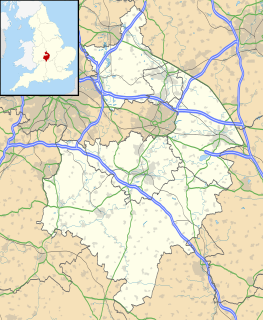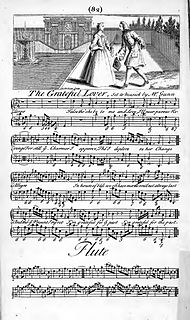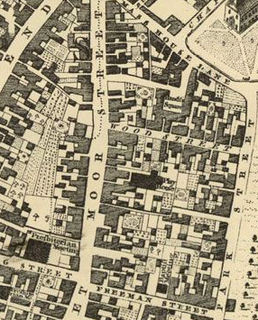Holte Bridgman's Apollo Gardens were one of the main pleasure gardens of 18th century Birmingham, located on Moseley Street in Deritend, within the parish of Aston. [1]

Birmingham is the second-most populous city in the United Kingdom, after London, and the most populous city in the English Midlands. It is also the most populous metropolitan district in the United Kingdom, with an estimated 1,137,123 inhabitants, and is considered the social, cultural, financial, and commercial centre of the Midlands. It is the main local government of the West Midlands conurbation, which is the third most populated urban area in the United Kingdom, with a population of 2,897,303 in 2017. The wider Birmingham metropolitan area is the second largest in the United Kingdom with a population of over 4.3 million. It is frequently referred to as the United Kingdom's "second city".
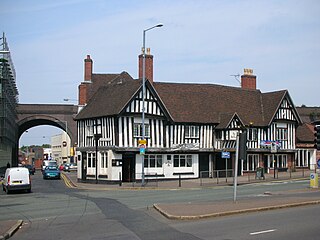
Deritend is a historic area of Birmingham, England, built around a crossing point of the River Rea. It is first mentioned in 1276. Today Deritend is usually considered to be part of Digbeth.

Aston is a ward of Central Birmingham, England. Located immediately to the north-east of Central Birmingham, Aston constitutes a ward within the metropolitan authority.
Entertainments at the Apollo included music – concerts of trios and duets by Arne and Handel are recorded in 1748 – and fireworks. [1] The Apollo was also the site of the first cricket match definitely recorded to have taken place within Birmingham, when "Eleven of the Gentlemen of the Holte Bridgman's Club and Eleven of the Gentlemen of Mr Thomas Bellamy's Club" played "the most of three innings, for Twenty-Two Guineas" on Monday 15 July 1751. [2]

Thomas Augustine Arne was an English composer. He is best known for his patriotic song Rule Britannia, a version of God Save the King, which became the British national anthem, and the song A-Hunting We Will Go. Arne was a leading British theatre composer of the 18th century, working at Drury Lane and Covent Garden.

Fireworks are a class of low explosive pyrotechnic devices used for aesthetic and entertainment purposes. The most common use of a firework is as part of a fireworks display, a display of the effects produced by firework devices. Fireworks competitions are also regularly held at a number of places.
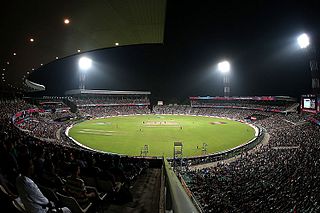
Cricket is a bat-and-ball game played between two teams of eleven players on a field at the centre of which is a 20-metre (22-yard) pitch with a wicket at each end, each comprising two bails balanced on three stumps. The batting side scores runs by striking the ball bowled at the wicket with the bat, while the bowling and fielding side tries to prevent this and dismiss each player. Means of dismissal include being bowled, when the ball hits the stumps and dislodges the bails, and by the fielding side catching the ball after it is hit by the bat, but before it hits the ground. When ten players have been dismissed, the innings ends and the teams swap roles. The game is adjudicated by two umpires, aided by a third umpire and match referee in international matches. They communicate with two off-field scorers who record the match's statistical information.
Although the Apollo Gardens were smaller and less successful than their principal rival, the Birmingham Vauxhall Gardens in Duddeston, an article from 1787 in Aris's Birmingham Gazette described them as "lovely, sequestered and elegant" and described how they could be reached by pleasure boat on the River Rea, travelling under the bridges of Deritend, Bradford Street and Cheapside past field paths "gay with wild flowers". [3]
Duddeston is an inner-city area of the Nechells ward of central Birmingham, England. It was part of the Birmingham Duddeston constituency until that ceased to exist in 1950.

The River Rea is a small river which passes through Birmingham, England. It is the river on which Birmingham was founded by the Beorma tribe in the 7th century.
The garden closed in 1751 when its owner resumed his profession of house painting. [4]


